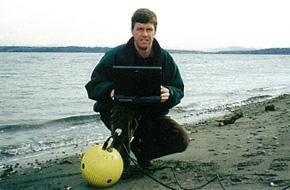
Ocean Spar Technologies
Most of my time is spent developing computer models of aquaculture cages and learning how they will behave in the offshore environment.
Education
- B.S., Physics, Bates College
- M.S., Ocean Engineering, University of New Hampshire
What is your current job and what does it entail?
I am an ocean engineer at Ocean Spar Technologies on Bainbridge Island, Wash. Our company develops and sells high performance offshore aquaculture cages to customers worldwide. I am very lucky in the sense that my job description changes almost every day. Most of my time is spent developing computer models of cages and learning how they will behave in the offshore environment. Through the use of the finite element method we are able to value engineer a product so that it is cost effective for the customer but still can withstand the rigors of the open ocean. I also spend some of my time out at sea inspecting our products after they have been installed and visiting potential sites for raising fish with customers. I also represent the company at academic conferences, presenting papers on our latest products. Between visiting farm sites and attending conferences, I have traveled to Cyprus, Indonesia, Ireland and Israel. Finally, part of my job requires that I dive on the cages to install current meters as well as inspect them for future design ideas.
What was the key factor in your career decision?
The ocean has always fascinated me. I grew up on it as a kid. I spent the summers at the beach and worked in the Caribbean as a skipper on a sailing boat in my early twenties. Ocean engineering seemed like the perfect way to combine my love of the sea and my physics degree from college. Also, my great uncle Athelston Spilhaus, who helped start Sea Grant, was an ocean engineer. While growing up I would hear about the marvelous projects he was working on, so it seemed quite natural for me to head in this direction.
What do like most about your career?
The fact that while we are producing a product that ultimately provides food to the masses, we are doing it in an environmentally conscientious fashion and having fun too.
What do you like least about your career?
The industry's lack of vision sometimes frustrates me. Fish farmers are very wary when it comes to trying new ideas. They prefer to stick to the archaic methods of farming even though it can be quite costly, unproductive and dangerous.
What do you do to relax?
When I get the chance, I love to go sailing. I also enjoy golf and working around the house and garden with my wife.
Who are your heroes/heroines?
I have two heroes. One I have already mentioned: Dr. Athelston Spilhaus, my great uncle and one of the founders of Sea Grant. His creativity was simply amazing. My other hero is anyone who goes out and makes the very best of each day despite circumstances.
What advice would you give a student who expressed an interest in pursuing a career in your field?
Fill your toolbox first. By that I mean don't go directly into ocean engineering. Get a mechanical or civil engineering degree first. It is there that you learn the basics. Though I was a physics major, I took the basic mechanical engineering courses before I went to grad school and that made all the difference.
Are career opportunities in your field increasing or decreasing and why?
The job potential in aquaculture is strong for engineers. Up until now it has mainly been biologists in the field. But as the demand for offshore rather than nearshore cages has increased, so has the need for talented engineers to build structures that will survive out there.
What will you be doing 10 years from today?
I would still like to be involved in offshore aquaculture in some capacity. I hope that the industry will have matured some by then so that there will be different challenges.

